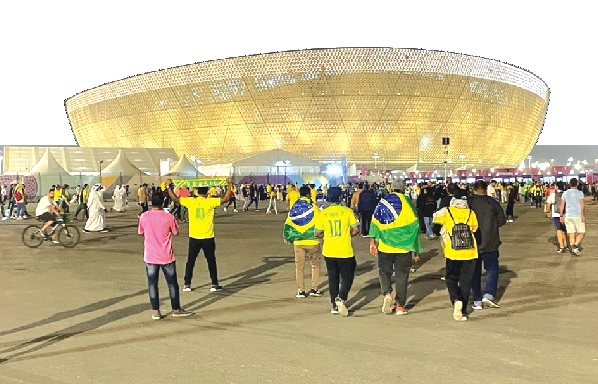The Ghanaian Perspective: Opinion Articles on Current Issues

Qatar: A Dose of Soccer and Tourism
Qatar is a high-income economy, backed by the world's third-largest natural gas reserves and oil reserves. It is one of the world's largest exporters of liquefied natural gas, and the world's largest emitter of carbon dioxide per capita.
Advertisement
Our first match was the Spain versus German match at the Al Bayt Stadium where the festival’s opening ceremony and the inaugural match also took place.
The stadium, which had been designed to be reused after the World Cup as a five-star hotel with a shopping Centre, food court, gym and multipurpose hall, as well as a sports medicine hospital, was located about 35 kilometres north of Doha.
To reach the tent-shaped stadium from our Al Wakrah accommodation base, we joined other football fans who trooped to the stadium in Qatar’s glittering brand-new metro, buses and taxis.
Free transportation
Unlike the 2018 World Cup in Russia where football fans only had free transport on match days, transportation in Qatar for fans with their Hayya identification cards was free throughout the games.
While five of the eight World Cup stadiums were directly connected to the metro, the remainder were connected by a combination of metro and bus services.
The atmosphere outside the stadium was very colourful as the Spanish and German fans were joined by other fans in a pre-match carnival of singing, drumming, dancing and taking photographs.
Soccer’s well-known emotive nature was brought to the fore as young and old fans, including those in wheelchairs and with crutches, could be seen dancing and singing together.
Despite all the new technology embedded in the ticketing arrangement to forestall racketeering, black market sales were still active as ticketless fans made last-minute efforts to buy tickets before the commencement of the match.
The match commenced at 8.35 p.m. and ended at 11 p.m. The late-night match fixtures were designed to avoid Qatar’s hot daytime climate.
The low nighttime temperature coupled with seat level vents that pumped out cool air during matches chilled the stadium so much so that some spectators had to go to the stadium with jackets and sweaters.
Even though our accommodation at the Al Wakrah section of Qatar, where most of the football fans were lodged, was described in some Western media as “a concrete complex on the edge of the desert, next to a slaughterhouse and a set of high-voltage electrical wires”, I still found the recently built housing estate made up of 1,404 clusters of three-storey buildings very comfortable.

Although not as posh as the five-star hotels in central Doha where the well-heeled footballers, fans, guests and officials were lodged, with its modern facilities which included a cooker, microwave, oven, refrigerator, hair dryer, flat-screen TV, Wi-Fi, washer/dryer, all the nine members of my team found the clean and airy three-bedroom facilities in Al Wakrah very homely.
The women in our team had also brought along some native African cuisine as a welcome relief to the otherwise monotonous bread and rice menu that we met on the ground.
Since 2010 when Qatar was given the nod by FIFA to host the World Cup, the country had been heavily criticised for what had been described as human rights abuses against migrant workers.
It had been alleged that about 6,000 migrant workers had died in Qatar while building FIFA World Cup stadiums due to harsh conditions of service imposed by contractors. It is also believed that hundreds of thousands of migrant workers paid illegal recruitment fees, or had their wages withheld for years by contracting firms.
It was while taking a walk in the well-kept Al Wakrah housing complex one early morning that I chanced on a migrant worker from Nepal and decided to engage him in a conversation.
The worker, who gave his name as Bashir, informed me that he had been enjoying his stay in Qatar. While he did not want to speak much on the issue of human rights abuses against migrant workers, he observed that the problem lies more with contractors and not with the government of Qatar.
To be continued




